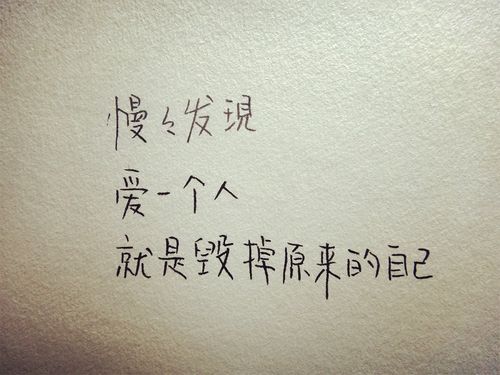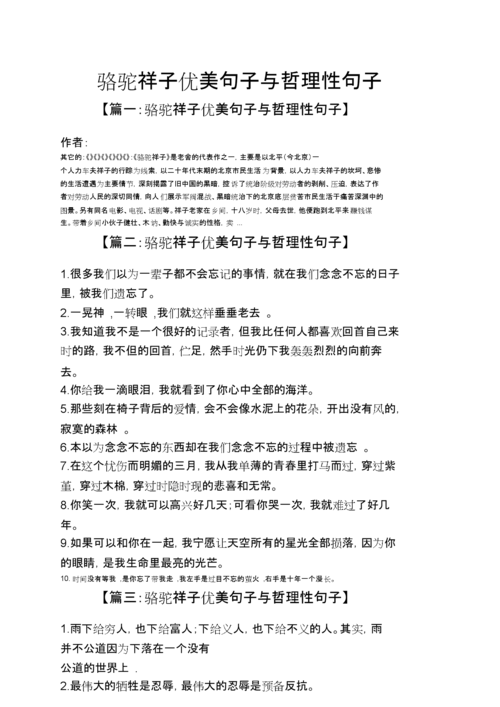
富有哲理的英文句子唯美(TheBeautyofPhilosophicalSentences)
Foreword:

Words have the power to inspire, to move, and to uplift. Philosophical sentences are a particular type of sentence that is designed to make us think and reflect on the deeper meaning of life. Whether it's a sentence from a famous philosopher or a simple statement that touches our hearts, philosophical sentences can help us understand ourselves and the world around us. This article will explore some of the most beautiful philosophical sentences and how they can provide us with wisdom.
Paragraph 1:

"The only true wisdom is in knowing you know nothing." This sentence by Socrates reminds us of the importance of humility. Instead of pretending to know everything, we should be willing to admit our ignorance and be open to learning.
Paragraph 2:
"The unexamined life is not worth living." Socrates also said this famous sentence. It challenges us to take a close look at our lives and ask ourselves whether we are living in accordance with our values and beliefs.

Paragraph 3:
"Man is the measure of all things." Protagoras made this statement, which suggests that our subjective experiences shape our perception of reality. We cannot fully understand the world outside of our own experience.
Paragraph 4:
"The only way to do great work is to love what you do." Steve Jobs' sentence reminds us that passion and enthusiasm are crucial for success. When we love what we do, we are more likely to put in the effort required to achieve greatness.
Paragraph 5:
"We are what we repeatedly do. Excellence, then, is not an act, but a habit." Aristotle said this sentence, highlighting the importance of habit and routine in our lives. If we want to be excellent, we must make excellence a habit.
Paragraph 6:
"Beauty is truth, truth beauty." John Keats' sentence suggests that beauty and truth are interconnected. There is something inherently beautiful about honesty and authenticity.
Paragraph 7:
"The opposite of love is not hate, it's indifference." Elie Wiesel's sentence reminds us that apathy is more dangerous than hatred. When we stop caring, we lose our humanity.
Paragraph 8:
"Life is what happens to us while we are making other plans." This sentence, attributed to John Lennon, reminds us that life is unpredictable. We may have plans and goals, but life has a way of throwing unexpected challenges at us.
Paragraph 9:
"The only constant in life is change." Heraclitus said this sentence, highlighting the impermanence of all things. If we accept change as a natural part of life, we can learn to adapt and grow.
Paragraph 10:
"Know thyself." This sentence, inscribed at the Temple of Apollo at Delphi, reminds us that self-knowledge is essential for personal growth and development.
Paragraph 11:
"In three words I can sum up everything I've learned about life: it goes on." Robert Frost's sentence reminds us that life is a journey, and we must keep moving forward despite the challenges.
Paragraph 12:
"Man is condemned to be free." Jean-Paul Sartre said this sentence, highlighting the paradox of human existence. We are free to make our own choices, but we must also face the consequences of those choices.
Paragraph 13:
"The unexamined life is not worth living." This sentence by Socrates challenges us to reflect on our lives and find meaning and purpose beyond mere existence.
Paragraph 14:
"The only thing necessary for the triumph of evil is for good men to do nothing." Edmund Burke said this sentence, highlighting the importance of taking action against injustice and wrongdoing.
Paragraph 15:
"The best way to predict the future is to invent it." Alan Kay's sentence reminds us that we have the power to shape our own destiny by taking action and creating the future we want.
Paragraph 16:
"To be yourself in a world that is constantly trying to make you something else is the greatest accomplishment." Ralph Waldo Emerson's sentence reminds us of the importance of authenticity and staying true to ourselves.
Paragraph 17:
"Be the change you wish to see in the world." Mahatma Gandhi's sentence challenges us to take action and make a difference in the world around us.
Paragraph 18:
"Action expresses priorities." This sentence by Mahatma Gandhi suggests that our priorities are reflected in our actions. If we want to achieve something, we must take action towards it.
Paragraph 19:
"All that we are is the result of what we have thought." The Buddha said this sentence, highlighting the importance of our thoughts and beliefs in shaping our lives.
Paragraph 20:
"We become what we think about all day long." Earl Nightingale's sentence is a reminder that our thoughts and beliefs can have a powerful impact on our lives and shape our reality.
Paragraph 21:
"Everything has beauty, but not everyone sees it." Confucius' sentence reminds us of the importance of perspective and open-mindedness. If we look for beauty, we will find it.
Paragraph 22:
"The journey of a thousand miles begins with one step." Lao Tzu's sentence reminds us that every great journey starts with a small step. We must take action towards our goals, even if it seems daunting at first.
Paragraph 23:
"Great minds discuss ideas; average minds discuss events; small minds discuss people." Eleanor Roosevelt's sentence highlights the importance of intellectual curiosity and open-mindedness.
Paragraph 24:
"In the middle of every difficulty lies opportunity." Albert Einstein said this sentence, reminding us that challenges can be opportunities for growth and learning.
Paragraph 25:
In conclusion, philosophical sentences can provide us with wisdom and inspiration. They remind us of the deeper meaning of life and challenge us to reflect on our own beliefs and values. By embracing the wisdom found in these sentences, we can live more fulfilling and meaningful lives.
- 上一篇:相爱简短走心的句子(心灵相连的美好)
- 下一篇:没有了



 微信收款码
微信收款码 支付宝收款码
支付宝收款码